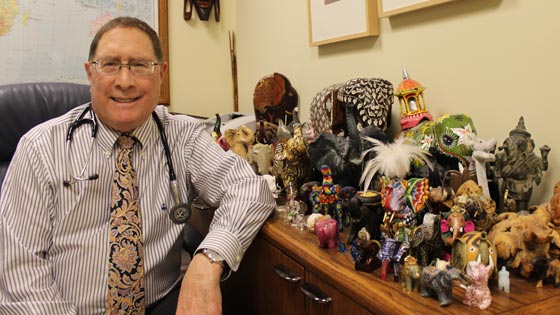
Dr. Jay Keystone’s 40-year career in tropical diseases has led him to numerous countries around the world. His office in Toronto General boasts a collection of elephants that he’s gathered during his travels. (Photo: UHN)
The Zika virus, Chikungunya virus, smallpox, dengue fever, leprosy and, “every worm imaginable.”
Dr. Jay Keystone has seen them all. A senior staff physician in Tropical Diseases at Toronto General Hospital, he has built a career in treating, preventing and teaching about tropical diseases.
"It's very interesting for us in tropical medicine because we get to see diseases we wouldn't normally see in Canada until people visit or come from other areas around the world," says Dr. Keystone.
Working in Toronto means being exposed to a global hub of tourists, immigrants, visitors, and individuals returning from trips to their home countries to visit their friends and relatives. Dr. Keystone labels the last group, "VFRs": Visiting Friends and Relatives.
"VFRs are a huge and very important group. They move to Canada, stay for a while and they don't realize they've lost their immunity to certain infections when they return to their homeland to visit," explains Dr. Keystone.
"Then they decide to visit back home and think they don't need to be immunized, and they end up getting really sick."
Dr. Keystone, who received the Order of Canada in 2015 for his role in expanding the discipline of tropical and travel medicine as a clinician and educator, says his proudest achievement is, "training myself out of a job."
Related to this story:
That's because as an educator and lecturer, Dr. Keystone prides himself on getting young doctors interested in the field of tropical medicine, and teaching them to treat their patients with detailed care and concern. Dr. Keystone estimates that over his 40-year career, he has trained approximately 960 young doctors in tropical medicine.
"Sometimes patients come in and we discover they don't have a tropical disease, but our job is still to make all of our patients better. So if their issue is not tropical, we do as much as we can to steer them in the right direction. I'm very proud of performing and teaching that approach to patient care."
Planning a trip: self-treatment and prevention tips
Dr. Keystone, also the director of Medisys Travel Clinic in Toronto, has numerous tips on preventing and treating certain ailments during travel. He advises that all travellers carry the following:
- Insect repellent, which should be applied after sunscreen. "If you put repellent first, it'll be affected by the sunscreen," he explains.
- Sunscreen with minimum 30 SPF
- After Bite – to treat insect bites regular symptoms such as itching and swelling
- Pain medication such as Tylenol or Advil
- Hand sanitizer: "A recent study showed that you reduce traveller's diarrhea by 30 per cent if you sanitize your hands. Diarrhea is almost always caused by something bacterial," explains Dr. Keystone.
- If you need regular medication, carry lots of it: one in your suitcase and one in your carry-on
- Antihistamine, in case you have a reaction to the insect bites
- Constipation medicine
- Medicine or antibiotic to treat traveller's diarrhea.
- Extra pair of sunglasses
"You can do everything right and get sick, and do everything wrong and stay well. It's a matter of luck, one's gut immunity and what's in the area being visited, so that's why it's good to pack these items for self-treatment," explains Dr. Keystone.
Since the threat of certain diseases differs depending on where one is visiting, Dr. Keystone also advises travellers to speak to a tropical disease specialist before they leave to learn what they should be immunized for and careful of when visiting.
What should be of concern to travellers?
When asked what should be of concern to Canadians and travellers in the field of tropical diseases, Dr. Keystone was quick to pinpoint one big issue: drug resistant bacteria.
"I think that will be the next major concern with infections. We're going to get to the point where people with regular infections can't be treated because bacteria have become so resistant to drugs."
He hopes that a greater push towards development of vaccines and newer drugs will combat this issue.

Dr. Keystone, pictured with the Governor General Designate David Johnston at the Order of Canada induction ceremony in May 2016, received this honour for expanding the field of tropical medicine as a clinician and educator.(Photo: Dr. Jay Keystone)
In the meantime, Dr, Keystone will continue his award-winning work as clinician and educator in the field of tropical diseases.
"I'm very excited about receiving the Order of Canada," says Dr. Keystone.
"I was reading through the list of fellow recipients, and they have done remarkable things! I am very humbled to be receiving this honour. I have had a wonderful career."
